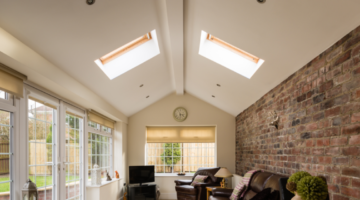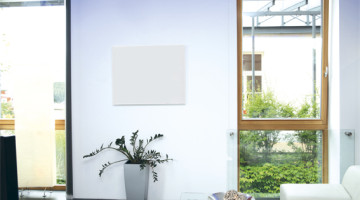
→ How do infrared heating panels work?
→ Is infrared heating efficient?
→ Is infrared heating safe?
→ Is infrared expensive to run?
→ Are there maintenance and servicing costs with infrared heating panels?
→ What size of infrared panels do I need?
→ Can I have an infrared panel in my bathroom?
→ How do I control infrared heaters?
→ Do far infrared panels glow?
→ What’s the best brand of infrared?
How do infrared heating panels work?
Infrared heating panels provide powerful, but comfortable heat, whilst looking great and taking up minimal space. This has made them a very popular modern heating choice. They work through far infrared radiation, which means that they heat up objects rather than air – unlike traditional convection heaters. They are the perfect solution for those without gas central heating, and also as cheap supplementary heating for those who do.
Is infrared heating efficient?
Infrared heating is 100% efficient; you get out what you put in. Heat travels directly from the panel to the solid objects in its path, warming surfaces, furniture and people. This cuts out the middle man, as it doesn’t waste energy heating the air. In contrast, convection (such as that from radiators) requires another transfer of energy during which heat is lost, meaning it is less efficient. Because infrared doesn’t heat air, the temperature is not affected by draughts in the room. You will require a lower wattage than equivalent convection heaters to reach the same temperatures. As heating is the main contributor to household bills, the low running costs of infrared heating could save you a lot of money.
Is infrared heating safe?
Yes! It is the same heat you get from the sun – and that your own body gives off! It’s even used to heat babies’ incubators.
Do bear in mind that, like any heater, the surface temperature can get pretty hot, so they’re usually mounted halfway up the wall, or popped out of the way on the ceiling (as we recommend for maximum efficiency).
Is infrared heating expensive to run?
Other forms of electric heating, such as storage heaters, are inefficient because they have to be heated to a very high temperature in order to work well. Most also have to power fans to distribute heat around the room. Infrared panels have a thin, tightly-coiled heating element evenly distributed across the inside. They only need to heat themselves to the relatively low temperature of 90°C in order to work efficiently, and there are no fans. The temperature output is the same as other electric heaters with a fraction of the energy input.
Are there maintenance and servicing costs with infrared heating panels?
Nope! Just make sure they’re installed correctly by a competent electrician. After that, you’ll just need to keep them clean with a soft, dry cloth.
What size of infrared panels do I need?
If you’re installing infrared heaters, the required wattage is unlikely to be as high as that of whatever heating system you have at the moment. The exact number, configuration and wattage of panels that your particular property would need is dependent on a host of factors including the current insulation on the building, the number and size of windows, the height of the ceilings, and several other factors. We generally suggest slightly oversizing, to ensure comfort. All that will happen is that the panels will switch themselves off once they reach the temperature you have pre-programmed.

If you’d like to discuss with one of our experts exactly what kind of panels would best suit your needs, please use the contact form on this page or give us a call on 0208 819 9153.
Can I put infrared in my bathroom?
Yes! All good panels (the brand we recommend) are CE-marked and completely safe for use in bathrooms. They have the added benefit of helping to reduce damp and condensation, as well as keeping the room toasty. A heated towel rail is a great addition, as is a mirror panel, as it won’t steam up like normal panels would!
How do I control infrared heaters?
To keep it simple, there are two basic options:
- Plug them into the mains (standard square-pin 13 amp domestic socket, like other UK appliances).
- Wire them in – this is what we’d always suggest. Then you can control them properly with a hardwired digital thermostat and smart heating system for optimal efficiency.
Do far infrared panels glow?
Mostly no. Near infrared heaters (i.e. patio heaters outside bars) glow orange. This kind of radiation is at the other end of the infrared spectrum, but far infrared, as well as giving off no light, is much more efficient. This is what all of our panels operate on.
What is the best infrared brand?
There are a lot of infrared companies out there, many of them making excellent panels.
It should be noted, however, that there are also a lot of bad ones. With any technology that is growing rapidly and slightly out of the mainstream, there is a tendency for there to be a deluge of cheap imports flooding the market. Some infrared companies are opportunistic; incredibly cheap panels with impossibly long warranties. These seem like a great option, until they inevitably stop working, you try to claim back on the warranty, and the company has ceased to exist. False economy at it’s best.
We prefer working with companies with longstanding reputations in the industry for excellent customer service and reliable systems. Look for a good range of heaters, and don’t be afraid to get more than one quote.
Think we missed something? Do you have a different opinion?
Comment below to get your voice heard…












what is operating temperature of your far infrared heater panel/ The skin absorbs wavelengths around 9.5 microns . Other advertisers state operating temperatures in the range 90C to 200C. So they do not produce the desired wavelength of 9.5 microns which would require a heater temperature of about the same as normal body temperature, but then there would be no transfer of energy from heater to skin. Could you clarify the matter please. thank you.
Are they better than storage heaters?
Yes.
We have a new all-timber,fully insulated, double glazed garden room. It is going to be used as an artist’s and potter’s studio all year round. Internal space is 4x3m. Insulation is in the roof, walls and floor. Could someone please contact me to advise on the correct infrared heating panel to purchase and install.
Kind regards,
Graham